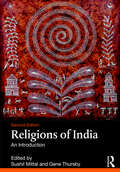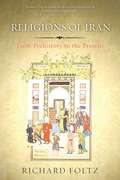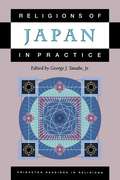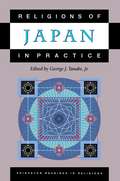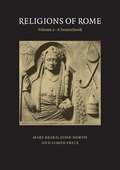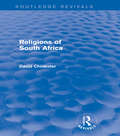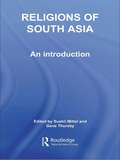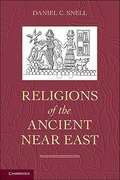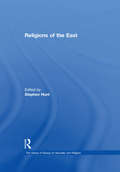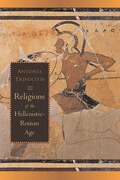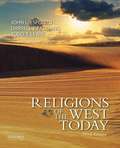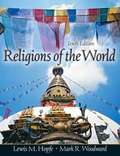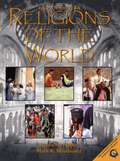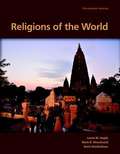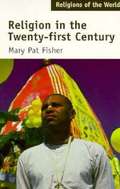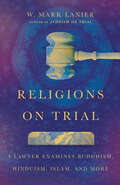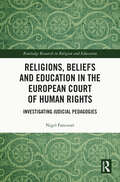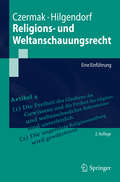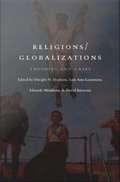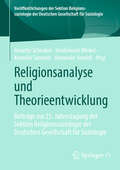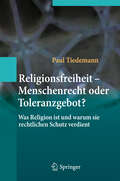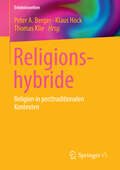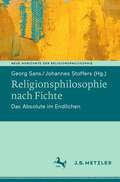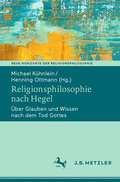- Table View
- List View
Religions of India: An Introduction
by Sushil Mittal Gene ThursbyIndia is a highly diverse country, home to a wide array of languages, religions, and cultural traditions. Analyzing the dynamic religious traditions of this democratic nation sheds light on the complex evolution from India’s past to today’s modern culture. Written by leading experts in the field, Religions of India provides students with an introduction to India’s vibrant religious faiths. To understand its heritage and core values, the beginning chapters introduce the indigenous Dharmic traditions of Hinduism, Jainism, Buddhism, and Sikhism, while the later chapters examine the outside influences of Zoroastrianism, Judaism, Christianity, and Islam. These chapters are designed for cross-religious comparison, with the history, practices, values, and worldviews of each belief system explained. The final chapter helps students relate what they have learnt to religious theory, preparing the way for future study. This thoroughly revised second edition combines solid scholarship with clear and lively writing to provide students with an accessible and comprehensive introduction to religion in India. This is the ideal textbook for students approaching religion in Asia, South Asia, or India for the first time. Features to aid study include: discussion questions at the end of each chapter, images, a glossary, suggestions for further reading, and an Companion Website with additional links for students to further their study.
Religions of Iran: From Prehistory to the Present
by Richard FoltzAlthough today associated exclusively with Islam, Iran has in fact played an unparalleled role within all the world religions, injecting Iranian ideas into the Jewish, Buddhist, Christian, and Manichaean traditions of the merchants who passed along the Silk Road. This vivid and surprising work explores the manner in which Persian culture has interacted with and transformed each world faith, from the migration of the Israelites to Iran thousands of years ago to the influence of Iranian notions on Mahayana Buddhism and Christianity. Foltz considers Iran's role in shaping the Muslim world, not only in the Middle East but also in South Asia in an evocative and informative journey through the spiritual heritage of an ancient and influential region.
Religions of Japan in Practice (Princeton Readings In Religions Ser.)
by George J. TanabeThe forty-five chapters in this anthology have no apparent master by which they may be ordered. This is, in part, by deliberate design, the attempt here being to present Japanese religions in their complex diversity rather than as neatly ordered systems of thought.
Religions of Japan in Practice (Princeton Readings in Religions #8)
by George J. TonabeThis anthology reflects a range of Japanese religions in their complex, sometimes conflicting, diversity. In the tradition of the Princeton Readings in Religions series, the collection presents documents (legends and miracle tales, hagiographies, ritual prayers and ceremonies, sermons, reform treatises, doctrinal tracts, historical and ethnographic writings), most of which have been translated for the first time here, that serve to illuminate the mosaic of Japanese religions in practice. George Tanabe provides a lucid introduction to the "patterned confusion" of Japan's religious practices. He has ordered the anthology's forty-five readings under the categories of "Ethical Practices," "Ritual Practices," and "Institutional Practices," moving beyond the traditional classifications of chronology, religious traditions (Shinto, Confucianism, Buddhism, etc.), and sects, and illuminating the actual orientation of people who engage in religious practices. Within the anthology's three broad categories, subdivisions address the topics of social values, clerical and lay precepts, gods, spirits, rituals of realization, faith, court and emperor, sectarian founders, wizards, and heroes, orthopraxis and orthodoxy, and special places. Dating from the eighth through the twentieth centuries, the documents are revealed to be open to various and evolving interpretations, their meanings dependent not only on how they are placed in context but also on how individual researchers read them. Each text is preceded by an introductory explanation of the text's essence, written by its translator. Instructors and students will find these explications useful starting points for their encounters with the varied worlds of practice within which the texts interact with readers and changing contexts. Religions of Japan in Practice is a compendium of relationships between great minds and ordinary people, abstruse theories and mundane acts, natural and supernatural powers, altruism and self-interest, disappointment and hope, quiescence and war. It is an indispensable sourcebook for scholars, students, and general readers seeking engagement with the fertile "ordered disorder" of religious practice in Japan.
Religions of Rome Volume 1
by Mary Beard Simon Price John NorthThis book offers a radical new survey of more than a thousand years of religious life in Rome, from the foundation of the city to its rise to world empire and its conversion to Christianity. It sets religion in its full cultural context, between the primitive hamlet of the eighth century BC and the cosmopolitan, multicultural society of the first centuries of the Christian era.
Religions of Rome: A Sourcebook (Volume #2)
by Mary Beard Simon Price John NorthThe book presents a wide range of documents illustrating religious life in the Roman world - from the foundations of the city in the eighth century BC to the Christian capital more than a thousand years later. Each document is given a full introduction, explanatory notes and bibliography, and acts as a starting point for further discussion. Judaism and Christianity are given full coverage, as important elements in the religious world of the Roman Empire.
Religions of South Africa (Routledge Revivals)
by David ChidesterFirst published in 1992, this title explores the religious diversity of South Africa, organizing it into a single coherent narrative and providing the first comparative study and introduction to the topic. David Chidester emphasizes the fact that the complex distinctive character of South African religious life has taken shape with a particular economic, social and political context, and pays special attention to the creativity of people who have suffered under conquest, colonialism and apartheid. With an overview of African traditional religion, Christian missions, and African innovations during the nineteenth century, this reissue will be of great value to students of religious studies, South African history, anthropology, sociology, and political studies.
Religions of South Asia: An Introduction
by Sushil Mittal Gene ThursbySouth Asia is home to many of the world's most vibrant religious faiths. It is also one of the most dynamic and historically rich regions on earth, where changing political and social structures have caused religions to interact and hybridise in unique ways. This textbook introduces the contemporary religions of South Asia, from the indigenous religions such as the Hindu, Jain, Buddhist and Sikh traditions, to incoming influences such as Christianity, Judaism and Islam. In ten chapters, it surveys the nine leading belief systems of South Asia and explains their history, practices, values and worldviews. A final chapter helps students relate what they have learnt to religious theory, paving the way for future study. Written by leading experts, Religions of South Asia combines solid scholarship with clear and lively writing to provide students with an accessible and comprehensive introduction. All chapters are specially designed to aid cross-religious comparison, following a standard format covering set topics and issues; the book reveals to students the core principles of each faith, compares it to neighbouring traditions, and its particular place in South Asian history and society. It is a perfect resource for all students of South Asia's diverse and fascinating faiths.
Religions of the Ancient Near East
by Daniel C. SnellThis book is a history of religious life in the Ancient Near East from the beginnings of agriculture to Alexander the Great's invasion in the 300s BCE. Daniel C. Snell traces key developments in the history, daily life and religious beliefs of the people of Ancient Mesopotamia, Egypt, Israel and Iran. His research investigates the influence of those ideas on the West, with particular emphasis on how religious ideas from this historical and cultural milieu still influence the way modern cultures and religions view the world. Designed to be accessible to students and readers with no prior knowledge of the period, the book uses fictional vignettes to add interest to its material, which is based on careful study of archaeological remains and preserved texts. The book will provide a thoughtful summary of the Ancient Near East and includes a comprehensive bibliography to guide readers in further study of related topics.
Religions of the East (The Library of Essays on Sexuality and Religion)
by Stephen HuntUnder the rubric of 'Religions of the East', which includes Buddhism, Hinduism, Sikhism, Janiism and a myriad of Chinese religio-philosophies, are a vast range of views concerning human sexuality. These contrasting attitudes are mapped through this volume on Religions of the East in The Library of Essays on Sexuality and Religion series. Part 1 presents previously-published articles that explore several Eastern Religions in the way they construct sexuality through expressions of their pertinent holy writings and belief systems, as applied in differing historical and cultural contexts. Part 2 takes sexual renunciation and asceticism as its focus through the traditions of Hinduism, Jainism and the Chinese religious systems. Part 3 explores the connection between sexuality, gender and sexuality in Hindu and Buddhist customs in varied social settings. The final part of the volume includes articles examining Eastern religions in their attitudes towards sexual 'variants' including bi-sexuality, trans-sexuality and contested sexual categories.
Religions of the Hellenistic-Roman Age
by Antonia TripolitisReligions of the Hellenistic-Roman Age is a superb introduction to the principal Western religions and their philosophical counterparts from the beginnings of Alexander the Great's empire in 331 B.C.E. to the emergence of the Christian world in the fourth century C. E. Anton?a Tripolitis, a noted scholar of Late Antiquity, examines the rise of the Hellenistic-Roman world and presents a comprehensive overview of its beliefs and practices, their socio-psychological and historical development, and the reasons for their success or failure. Her work explores Mithraism, Hellenistic Judaism, Christianity, Gnosticism, and the philosophies of Stoicism, Epicureanism, and Middle Platonism. It also includes a review of the principal mystery cults, Demeter in Eleusis, Dionysus, Isis, and Cybele or Magna Mater. Based on the most reliable and up-to-date research on the ancient world, this volume is valuable both as a general guide to ancient Western religion and as essential background reading for the study of early Christianity.
Religions of the West Today
by John L. Esposito Darrell J. Fasching Todd T. LewisIdeal for courses in Western religions, Religions of the West Today, Third Edition, covers the same material contained in the authors' longer textbook, World Religions Today, Fifth Edition. Revealing the significance of religion in contemporary life, it explores Judaism, Christianity, Islam, indigenous religions, and new religions as dynamic, ongoing forces in the lives of individuals and in the collective experience of modern societies. <P><P>This unique volume accomplishes two goals: it connects today's religions to their classical beliefs and practices and focuses on how these religions have both radically changed the modern world and been changed by it. The book is enhanced by numerous pedagogical aids--text boxes, timelines, maps, illustrations, discussion questions, a comprehensive glossary of key terms, and suggestions for further reading--and more than 100 photographs. For a wealth of additional teaching and study resources, visit the book's Companion Website.
Religions of the World (10th Edition)
by Lewis M. Hopfe"Hopfe did an incredible job of making the material readable and flow in a logical fashion...Even with a recent flood of introductory-level texts dealing with the subject, it remains the best introductory text dealing with religions of the world. " Michael Krogman, Chattanooga State Technical College. How does religion affect you? Religion plays a large role in the world events that affect us all; it has an impact on almost everything, from politics to pop culture. The study of religions is essential and Religions of the World provides a comprehensive and engaging introduction. Using a style that is friendly and readable, Religions of the World explains complex themes within the context of real people in real life. This text acquaints you with the teachings, ethics, worship-style, and celebrations of a broad range of religions, from their inception to today. Each chapter features primary source material that gives you first-hand experience with writings that help define each religion. For the tenth edition of Religions of the World, Mark R. Woodward has drawn on his relationships in the Arizona Native American community, his experience living and working in Buddhist and Muslim cultures for extended periods, and his experience teaching thousands of undergraduates an introduction to religions of the world.
Religions of the World (Eighth Edition)
by Lewis M. Hopfe Mark R. WoodwardOffers accurate, comparative descriptions of a broad range of religions and explores living religions in terms of historical and cultural factors that produced them, the lives of their founders, their basic teachings, and their historical development and current status in the world.
Religions of the World, Thirteenth Edition
by Lewis M. Hopfe Mark R. Woodward Brett HendricksonFor courses in World Religions Discover the importance of religion in the world's cultures - yesterday and today The histories, deep-seated beliefs, and ethical systems that make up the world's religions are some of the most important forces at play on our incredibly diverse planet. Religions of the World, Thirteenth Edition guides students as they explore each of the world's major faiths, imparting the knowledge they need to better understand today's world. By explaining religious diversity and complex themes within a historical context, Religions of the World helps students relate to cultures very different from their own. Religions of the World, Thirteenth Edition is also available via REVEL(tm), an immersive learning experience designed for the way today's students read, think, and learn.
Religions of the World: Religion in the Twenty-First Century
by Ninian Smart Mary Pat FisherReligion in the Twenty-first Century is a unique and informative survey of the global religious situation as we enter the new millennium. Through a thematic and people-oriented approach, this book provides a valuable introduction to a variety of new religious movements--whether offshoots of traditional religions of founded as a result of millennial expectations or charismatic leaders. It also considers the role of the Interfaith Movement and the ways in which modern technology is spreading religions both new and old. KEY TOPICS: Provides valuable pedagogy, including: timeline; maps; glossary; list of sacred days/festivals; suggested reading; pronunciation guide; index; feature boxes focusing on some aspects of the arts; 11 black and white pictures and artworks.
Religions on Trial: A Lawyer Examines Buddhism, Hinduism, Islam, and More
by W. Mark LanierPeople today encounter a dizzying array of religious options.Trial lawyer Mark Lanier presents the claims made by the world's great religions, discusses their histories, and cross-examines their witnesses (their scriptures and traditions) to determine whether their claims are worthy of belief. With his keen legal mind and methodical style, he provides a careful comparative study, highlighting key truths he finds in each religion even as he offers critiques. Treating each perspective on its own terms and weighing the worldviews for consistency and livability, Lanier assesses evidence for and against belief systems with criteria for what constitutes sufficient proof.Believers and unbelievers alike will find here perceptive insights into how we can make sense of competing religious claims and what difference it makes for our own lives.
Religions, Beliefs and Education in the European Court of Human Rights: Investigating Judicial Pedagogies (Routledge Research in Religion and Education)
by Nigel FancourtThe Routledge Research in Religion and Education series aims at advancing public understanding and dialogue on issues at the intersections of religion and education. These issues emerge in various venues and proposals are invited from work in any such arena: public or private education at elementary, secondary, or higher education institutions; non-school or community organizations and settings; and formal or informal organizations or groups with religion or spirituality as an integral part of their work. Book proposals are invited from diverse methodological approaches and theoretical and ideological perspectives. This series does not address the work of formal religious institutions including churches, synagogues, mosques, and temples. Rather, it focuses on the beliefs and values arising from all traditions as they come into contact with educational work in the public square. Please send proposals to Mike Waggoner (mike.waggoner@uni.edu) and Alice Salt (alice.salt@tandf.co.uk).
Religions- und Weltanschauungsrecht: Eine Einführung (Springer-Lehrbuch)
by Gerhard Czermak Eric HilgendorfDas Religions(verfassungs)recht hat angesichts der veränderten religionspolitischen Lage Konjunktur. Das Buch gibt eine kompakte Einführung in die theoretisch und praktisch wichtigsten Bereiche des Religionsrechts und greift vernachlässigte Fragen (etwa im Schulwesen oder bei der Kirchensteuer) auf. Es will überzeugen durch klare rechtliche Grundbegriffe und eine Abkehr von einer einseitig kirchenzentrierten Sichtweise. Normtexte und Rechtsprechungsübersichten runden das leserfreundliche, auch für Nichtjuristen interessante Buch ab.
Religions/Globalizations: Theories and Cases
by David Batstone Eduardo Mendieta Dwight N. Hopkins Lois Ann LorentzenFor the majority of cultures around the world, religion permeates and informs everyday rituals of survival and hope. But religion also has served as the foundation for national differences, racial conflicts, class exploitation, and gender discrimination. Indeed, religious spirituality, having been transformed by contemporary economic and political events, remains both empowering and controversial. Religions/Globalizations examines the extent to which globalization and religion are inseparable terms, bound up with each other in a number of critical and mutually revealing ways. As the contributors to this work suggest, a crucial component of globalization--the breakdown of familiar boundaries and power balances--may open a space in which religion can be deployed to help refabricate new communities. Examples of such deployments can be found in the workings of liberation theology in Latin America. In other cases, however, the operations of globalization have provided a space for strident religious nationalism and identity disputes to flourish. Is there in fact a dialectical tension between religion and globalization, a codependence and codeterminism? While religion can be seen as a globalizing force, it has also been transformed and even victimized by globalization. A provocative assessment of a contemporary phenomenon with both cultural and political dimensions, Religions/Globalizations will interest not only scholars in religious studies but also those studying Latin America, the Middle East, South Asia, and Africa. Contributors. David Batstone, Berit Bretthauer, Enrique Dussel, Dwight N. Hopkins, Mark Juergensmeyer, Lois Ann Lorentzen, Eduardo Mendieta, Vijaya Rettakudi Nagarajan, Kathryn Poethig, Lamin Sanneh, Linda E. Thomas
Religionsanalyse und Theorieentwicklung: Beiträge zur 25. Jahrestagung der Sektion Religionssoziologie der Deutschen Gesellschaft für Soziologie (Veröffentlichungen der Sektion Religionssoziologie der Deutschen Gesellschaft für Soziologie)
by Heidemarie Winkel Kornelia Sammet Alexander Yendell Annette SchnabelReligion ist ein gesellschaftliches Feld, das starken Dynamiken unterworfen ist: Religion und Religiosität reagieren sensibel auf sozialen Wandel, treiben ihn mit ihren Eigendynamiken voran oder blockieren ihn. Der vorliegende Band entstand im Anschluss an eine Tagung anlässlich des 25-jährigen Bestehens der Sektion Religionssoziologie der Deutschen Gesellschaft für Soziologie. Die Beiträge spiegeln die lebendige soziologische Forschung zu der engen Koppelung von Religion(en) und Gesellschaft und haben eine explizit feld-historische Perspektive: Sie thematisieren sowohl Veränderungen dieser Verzahnungen als auch die theoretischen und empirischen Erforschungsperspektiven und bilden die damit verbundenen aktuellen Diskurse innerhalb der deutschen Religionssoziologie ab.
Religionsfreiheit - Menschenrecht oder Toleranzgebot?
by Paul TiedemannDer Autor diskutiert in dem Buch die Frage, ob die Religionsfreiheit nach philosophisch gerechtfertigten Maßstäben tatsächlich ein Menschenrecht ist oder ob es sich eher um ein - vor allem geschichtlich zu erklärendes - Toleranzgebot handelt.
Religionshybride
by Peter A. Berger Klaus Hock Thomas KliePosttraditionale Gemeinschaften tragen durch die Erschaffung ortsgebundener Utopien mit eigenen Mythen und Ritualen zur Wiederverzauberung der Welt bei, so der französische Soziologe Michel Maffesoli. An der Universität Rostock wird untersucht, inwiefern diese Gemeinschaften Ausdrucksgestalten einer Religionsproduktivität darstellen. Bilden sich über eine religionshybride Kultur neue Formen von Religion oder religiös überformte Lebensstile jenseits institutionalisierter Religionspraktiken heraus? Entgegen der revisionsbedürftigen These vom Verschwinden der Religion soll in Erfahrung gebracht werden, wie sich Religion an alten Dorfkirchen und anderen auratischen Orten möglicherweise neu und anders herausbildet. In den Blick geraten somit auch die besonderen Formen von Vergemeinschaftung und Vernetzung, Festkulturen und Events wie Hoffeste, Werthaltungen und soziale Motive.
Religionsphilosophie nach Fichte: Das Absolute im Endlichen (Neue Horizonte der Religionsphilosophie)
by Georg Sans Johannes StoffersJohann Gottlieb Fichte (1762–1814) befasste sich zeitlebens mit Fragen der Religion. Der frühe Fichte sah einen engen Zusammenhang zwischen göttlicher Weltregierung und sittlicher Ordnung – so zeigt sich das Absolute für ihn im Endlichen. Später entwickelte Fichte eine mystische Auffassung des religiösen Glaubens. Beides ist von bleibender Aktualität. Fichte verbindet Religiosität mit der Perspektive persönlichen Wachstums und lebendiger Hoffnung. Außerdem richtet er sein Augenmerk auf die moralischen Implikationen des religiösen Glaubens für den Einzelnen wie für die Gemeinde der Gläubigen. Dabei ist er sich der politischen Relevanz und gesellschaftlichen Brisanz von Religion bewusst. In dem Band der Reihe Neue Horizonte der Religionsphilosophie wird diese Denkbewegung Fichtes hermeneutisch nachvollzogen und systematisch reflektiert, um Fichtes Einsichten auch für die gegenwärtigen Debatten um das Verhältnis von Moral, Religion und Gesellschaft fruchtbar zu machen.
Religionsphilosophie nach Hegel: Über Glauben und Wissen nach dem Tod Gottes (Neue Horizonte der Religionsphilosophie)
by Henning Ottmann Michael KühnleinWir leben unter Bedingungen einer Wiederkehr der Religion. Die damit verknüpften Herausforderungen hat Hegel als einer der ersten Denker der Moderne bereits verinnerlicht. Jede Religionsphilosophie habe nach dem „Tode Gottes“ anzusetzen; denn die Vernunft könne, so Hegel, sich nur selbst verstehen, wenn sie die Religion in die eigene Bewegung des Geistes mit einbezieht. Aufhebung und Bewahrung sind demnach die noblen Insignien des Begreifens, die die komplementäre Verschränkung von Philosophie und Religion von ihrem Innersten her durchmessen. In dem hier anzuzeigenden ersten Band der Reihe "Neue Horizonte der Religionsphilosophie" wird diese Denkbewegung Hegels hermeneutisch nachvollzogen und systematisch reflektiert, um Hegels Einsichten auch für die gegenwärtigen Debatten um das rechte Verhältnis von Vernunft und Religion, von Gott und Säkularität fruchtbar zu machen.
